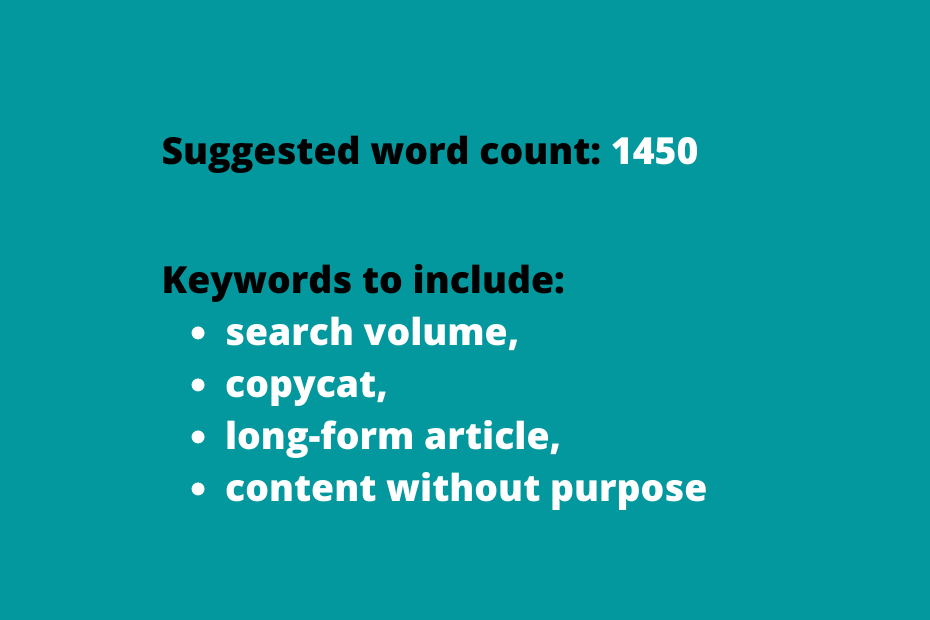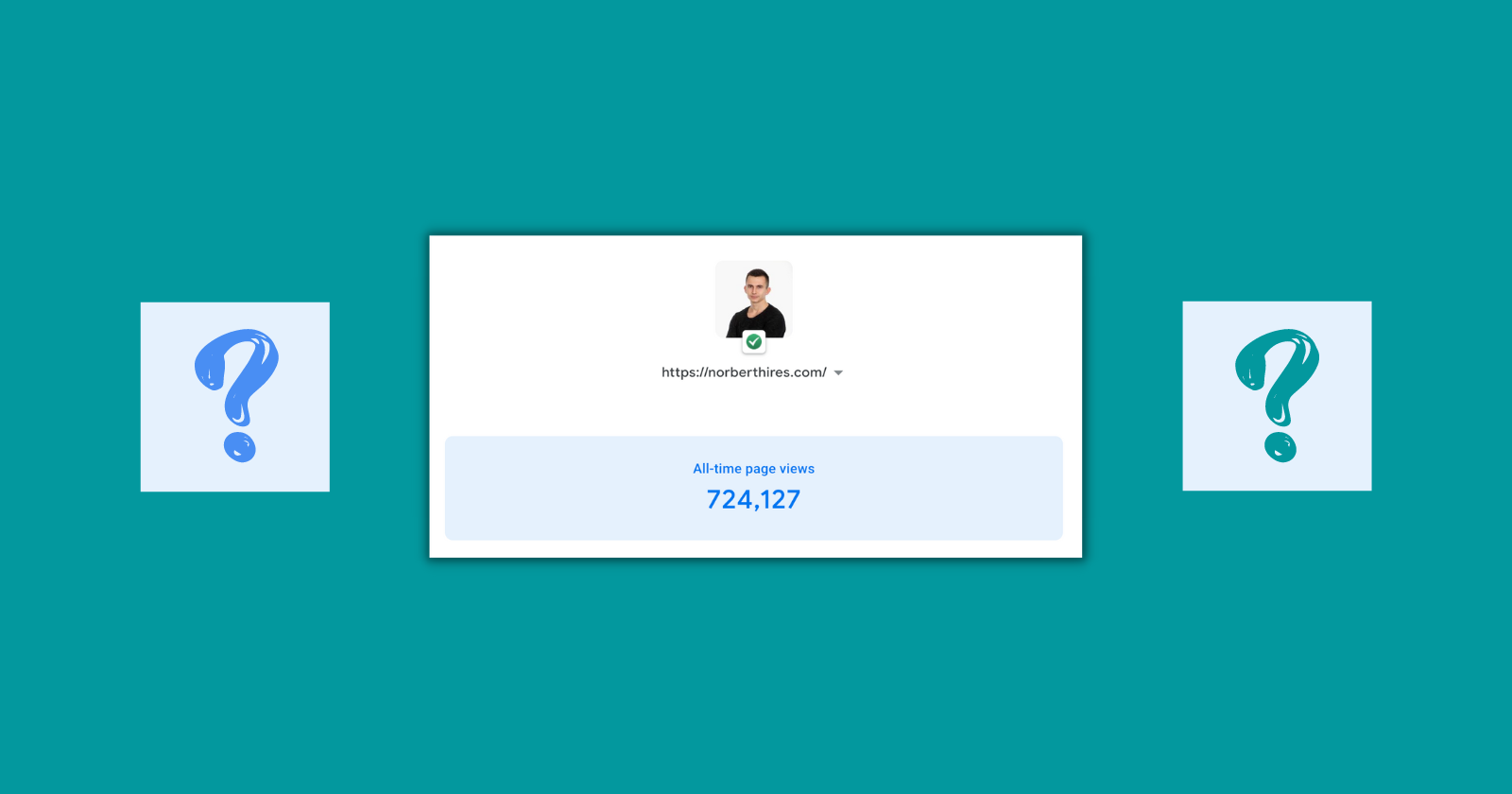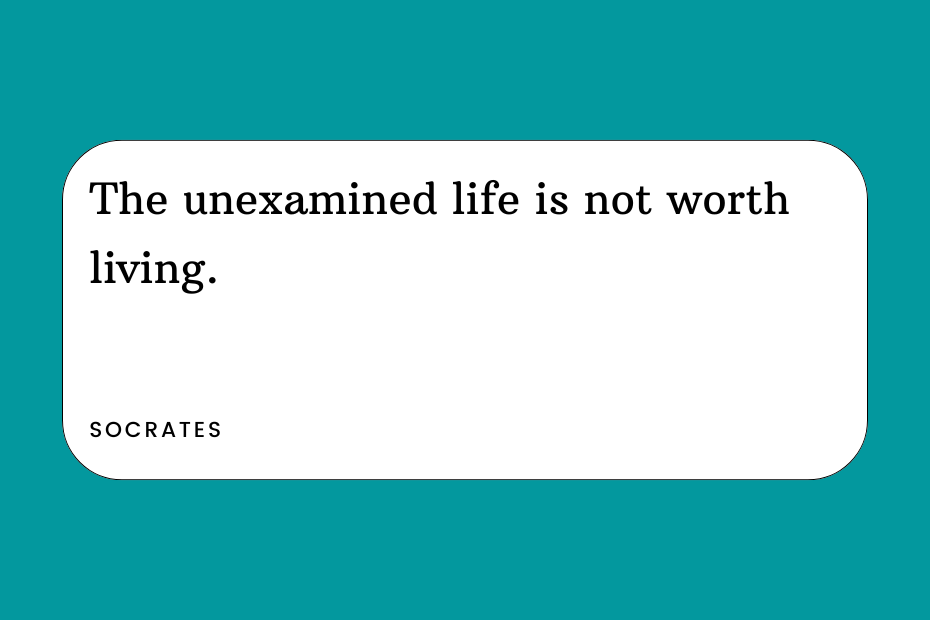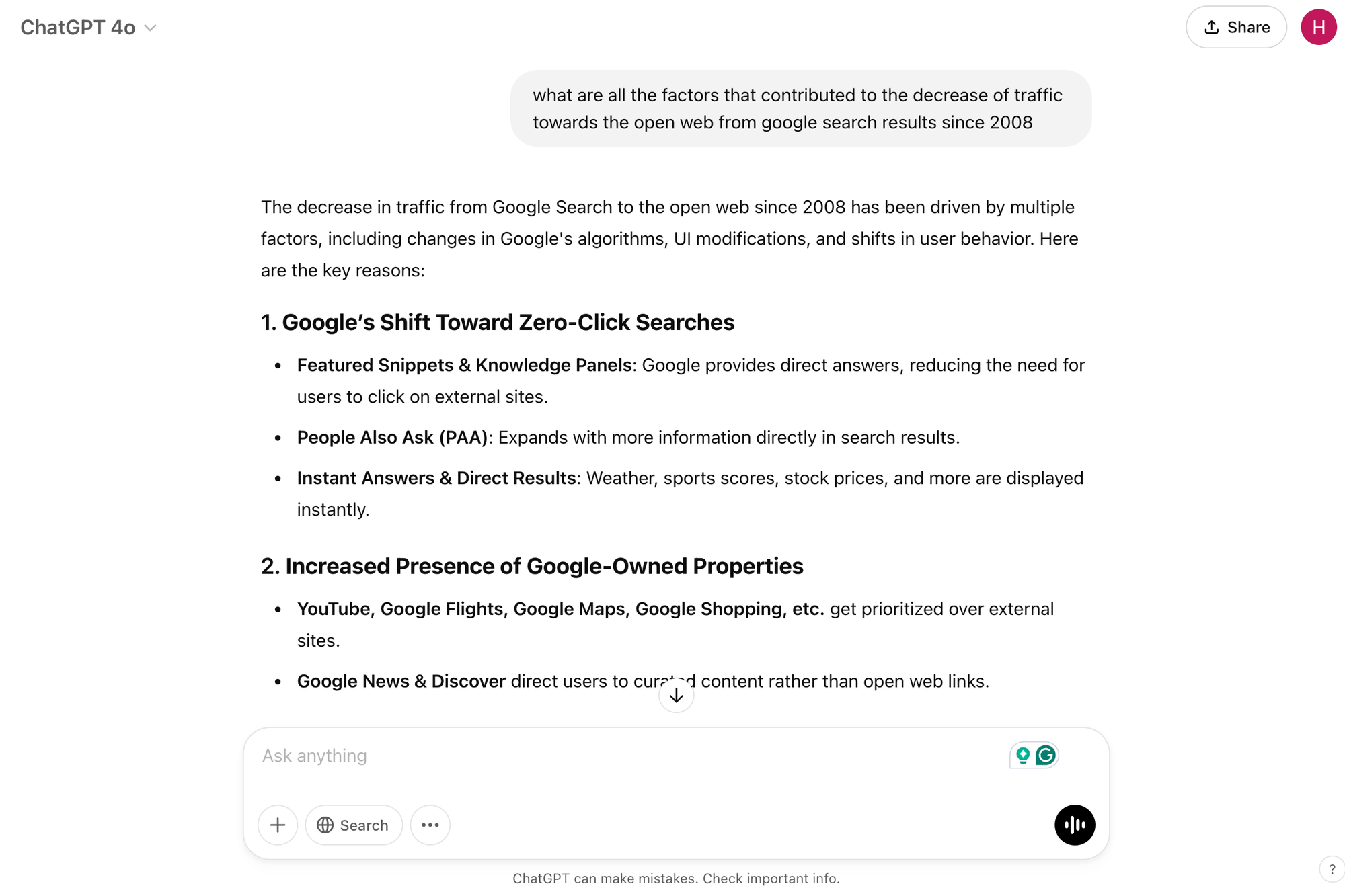Lessons from Six Years of Writing Online
Reflections on audience behaviors, platform pitfalls, and what keeps writing online worth it.

Every year, when the renewal notice for my domains lands in my inbox, I pause. Is it still worth it? In 2025, where AI churns out content faster than ever, and readers scroll past essays in favor of bite-sized videos, the fight for attention feels more daunting than ever. The landscape has shifted, but does that mean writing no longer has a place?
In the last 6 years, I shared the ups and downs of my journey in a few pieces:



Today, I’ll explore how the internet has evolved in recent years, the impact on online publishing, the shifts in my own motivation, and why—despite the rise of AI—I still believe writing has a place in this new landscape.
Thinking long-term is risky

My first professional experience was at an SEO agency, managing multiple clients with the same familiar pattern.
- An introduction via email.
- A request for Google Search Console access (which often went ignored for a week).
- A follow-up email a month later, where the client either demanded results or blamed us for the lack of them.
Experienced colleagues advised me to emphasize that SEO is a long-term investment, promising that "SEO will bring fruits for years to come". Another common suggestion was to set expectations—clients shouldn’t expect significant progress in the first nine months. Where did this nine-month timeline come from? I have no idea, but it was everywhere on the web.
In reality, SEO can be fast, but only if you know what you're doing and act quickly. These two factors will matter even more moving forward.
However, the lie lies in saying that "SEO will bring fruits for years to come".
Platforms change

1. Searching and Blogs
When it comes to attracting customers or readers from organic search I have two similar experiences that are in line with several other colleagues' opinions who spent some years driving traffic from Google to content-heavy websites.
I work with marketplaces that have millions of URLs across multiple countries, and I’ve noticed a frustrating pattern: if we weren’t launching something that drove major growth, traffic started to decline—even when our rankings stayed the same.
I’ve seen the same trend in blogging. Six years ago, I published articles that ranked for popular keywords and, for a while, they lived up to the promise of “SEO results that last.” But even as interest in those topics grew, my traffic was cut in half.
SEO in 2025 is far tougher than it was six years ago. Google’s shift toward zero-click searches means users get answers without ever leaving the results page. Featured snippets, knowledge panels, and “People Also Ask” boxes dominate, reducing the need to visit external sites. Meanwhile, Google prioritizes its own properties—YouTube, Flights, Maps, and Shopping—pushing organic results further down. Ads take up more space, leaving less room for traditional rankings.
In short, the same effort now delivers fewer results.
2. Poor Alternatives to Grow When Writing Online
Some could argue that if the SEO blog concept is dead, then you should just find other online spaces that replace a Google search as the discovery engine for readers. But I like to have my own real estate on the open web and the power plays I have seen play out in the last few years did not convince me to do otherwise.

There have been a few occasions when a new team came out with a great product for publishing online. Their platform had superior UX, they were shipping new features fast, and one of the best parts, they offered unproportionally big reach. Initially. Then they had to try to become a profitable business. Some did this with paywalls, some took a cut of earnings but most cut back the reach of creators who did not pay. It is strange to see the same writers on Substack now who were contributing to publications on Medium a few years ago.
The other alternative was using social media, which I discarded for two reasons:
- I am not good at crafting short-formplatforms content. I did not have big successes on platform like X or Threads but when I went semi-viral there the impact did not translate to newsletter subscribers or readers to my long-form content. Also, I can get hooked on the analytics of these platforms. Checking your reach every 5 minutes is not a healthy thing after you write a tweet about digital detox.
- Social media wants to keep you on social media. When I started blogging I crafted UTM tags for my new articles and shared the tagged links on my social media timeline, I dropped them in relevant Facebook groups and then tracked the results. It felt good that upon publishing I received a small influx of readers, and when the spike flattened out my article started to rank in Google. I stopped sharing my writings on social media because the UTM tags didn't record any hits. Most social media platforms significantly cut the reach of posts that contain a link. Facebook wants you to write on Facebook and Linkedin does the same.
Readers Change
Whenever I send out a new newsletter, some readers unsubscribe. At first, I wondered what I was doing wrong. The frequency—weekly or biweekly—seemed reasonable. I stuck to the topics I promised and even received positive feedback from others.
Then it hit me: I barely read the newsletters I subscribed to six years ago. Not because they were bad, but because they had already served their purpose. I had learned what I needed—just as my readers eventually move on.
Some blogs are like the ladder:
My propositions are elucidatory in this way: he who understands me finally recognizes them as senseless, when he has climbed out through them, on them, over them. (He must so to speak throw away the ladder after he has climbed up it.) - Ludwig Wittgenstein
How the average US teen distributes their daily screen time in 2024 - Source
| Activity | Average Daily Screen Time |
|---|---|
| Watching TV/Videos | 3 hours 16 mins |
| Gaming | 1 hour 46 mins |
| Social Media | 1 hour 27 mins |
| Browsing Websites | 51 mins |
| Other | 29 mins |
| Video Chatting | 20 mins |
| E-reading | 15 mins |
| Content Creation | 14 mins |
Readers change in other ways and often it is visible only if we zoom out for a multiple-year horizon. If I compare the average time readers spent tinkering with my articles then the 2024 numbers are barely different from 2023. But if I do the same comparison for the 6 years there is a gradually decreasing trend in reading time. Readers arriving from the same keywords engage less with my writing.

I once believed that Substack’s rise would make newsletters mainstream and help independent publishers turn casual readers into loyal subscribers. But my experience has been the opposite—my conversion rate has declined across all my writing projects. When I ran a Hungarian newsletter on Substack, I eventually gained more subscribers from Substack’s recommendations than from my own blog, despite having 15,000 monthly readers.
Another major shift has been the move from blogs to videos. The teams I worked with in SEO have pivoted to TikTok and YouTube, where their content outperforms blogs in terms of views and engagement. As a fan of blogs, I could argue that articles convert better than videos—but my own experience suggests otherwise. Even my own habits have changed; I watch more videos than I read blogs. In 2025, with so many platforms competing for attention, long-form articles are simply not the strongest offer.
I changed
When I got my first computer, the first thing I did—strangely enough—was start a blog. Free blog platforms made it easy, and every new interest became a new project. A cocker spaniel puppy? Blog about dogs. A growing love for anime? Another blog, even hosting pirated episodes. After launching four or five different blogs, I felt the same rush of excitement each time—followed by a quiet sadness as the older ones faded away.
Anticipating that my interests would keep shifting, I eventually moved away from niche blogs and registered a domain under my own name, giving myself the freedom to evolve without abandoning past work.

For long years I have been a productivity junky. I researched and wrote about most productivity methods and books on this blog. After spending years with some of these methods and seeing their impact on me in the long term I abandoned most.
Take the Zettelkasten method. On paper, it sounds great, but when you realize that you barely spend any time reviewing your old notes and when you do it feels like wasted time, then you question its validity as a way of life.
Do something you moderately enjoy for 5 years and you will stop it if it doesn't bring results or happiness.
With that, the type of books I read, the books I write about, and the topics of this blog shifted. From feel-good books like The 48 Laws of Power I moved towards more thorough and practical reads like Crucial Conversations.
I also shifted from reading in Hungarian to almost exclusively reading in English. Translating every quote just to write a Hungarian newsletter about a book that wasn’t even published in the language became more of a hassle than it was worth. So, I doubled down on this blog instead and let my Hungarian one go. During this time, I moved to Spain, bringing all the changes that come with a new country.
The ROI of writing online now and in the future
I did not start writing online with a clear goal in mind so over time I tried every type of justification on why it is worth spending 10+ hours weekly on publishing pixels on the internet.
Money
The typical promise of online writing courses—earning a fortune—never interested me. I never wanted to put a price on my writing, so I dismissed the usual monetization strategies early on. I believe in giving content away for free, and I’ve always been skeptical of hour-long videos repackaged as “courses.”
Though to justify the value of my effort I did the bare minimum to enable others to value my work. I registered a "send my a coffee" page and later enabled the premium tier of Substack without any extra content offer. I got a handful of recurring supporters. They had more impact on my perception of the usefulness of my content than on my purse, but they taught me an important lesson. Even if I wouldn't pay to read my stuff, others would.
Money can be a goal of writing online and with all the new tools it is not as painful to receive financial upsides for word crafting, though I have other reasons.
Opportunities
My second justification was that, while Substack money wouldn’t send me to the Bahamas, writing could attract opportunities with financial upside. In part, this turned out to be true—I landed a few freelance SEO clients through my blog. But in reality, 99% of my professional opportunities came from word-of-mouth recommendations, not from writing about my work.
Still, writing has given me something more valuable: the chance to connect with people who share my mindset and invite new perspectives into my life. And some things are worth more than money.
Writing is thinking

Some people process their thoughts while riding the bus or walking to work. I admire the beauty of trees and grumble at the ugliness of office buildings during those moments, but my own thinking works differently. I need to sit down, jot down bullet points, and shape them into a story. By the time I’m done, I have more clarity—and a sense of accomplishment.
I don’t have to publish these writings, but doing so doesn’t hurt me and might help someone else. More importantly, it keeps me motivated. Writing in a Google Doc doesn’t excite me, but publishing something online, week after week, pushes me to show up.
Writing when AI is eating the world
LLMs are impressive, but also they’ve forced me out of my writing comfort zone. They handle the easy stuff better than I ever could. It’s not just that people will read fewer articles and interact more with AI chatbots—tools like Perplexity already provide concise answers to top-of-the-funnel queries.
The era of 3,000-word cornerstone content designed to rank is over. In some ways, I welcome this shift, but it also wipes out 90% of my "easy-to-write-about" topics. Now, I have to go deeper. I have to think harder. I have to share firsthand experiences—things AI hasn’t been trained on yet.
Personal insights and real human perspectives will matter more, while generic company blogs churning out “What is content marketing?” articles will fade into irrelevance.

But we can not disregard how AI made writing easier. I used ChatGPT to point out all the factors impacting the decrease in clicks, I used it to find the author of quotes I did not remember and make certain paragraphs shorter.
I saved time and made this article richer thanks to LLMs. What increased the usefulness of these new AI tools for me the most is realising that they require clear instructions and detailed context. If you write anything besides Whatsapp messages, then you have an advantage when using these tools.
Other less thought advantage of writing a blog over a long period of time that you create screenshots of yourself at different times. It is not just nostalgic to reread these pieces of content but you can use them to train AI to challenge your thinking or return more personalised results for you.
So, is it still worth it? Every year, when the domain renewal email lands in my inbox, I hesitate for a second. But then I remember—writing online is more than just rankings, clicks, or subscribers. It’s a way to think, to document, to connect. The landscape will keep shifting, AI will keep getting better, and readers will keep changing. But as long as writing helps me make sense of the world, I’ll keep hitting publish—whether the algorithm cares or not.







